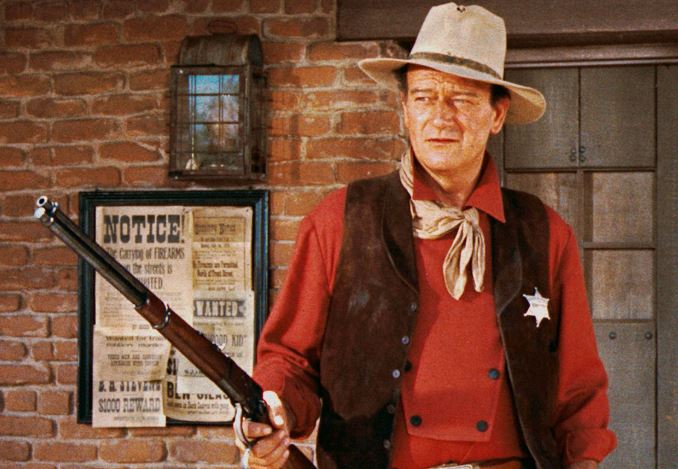In Hollywood, studios tend to think, “If it ain’t broke, don’t fix it”. This is why so many movies, especially the biggest blockbusters, feel like cookie-cutter replications with minor changes to differentiate them. After all, the name of the game is to put butts on seats, so if a studio finds a formula that works, they’ll more than likely stick to it.
In an ideal world, cinephiles would like to think that the actual creative people involved in films don’t think that way, though, and more often than not, they don’t. However, even the most iconic stars have repeated themselves to ensure a quick buck occasionally – and John Wayne was guilty of it more than once.
Two directors became synonymous with The Duke during his career: John Ford and Howard Hawks. Wayne made a staggering 14 films with Ford, including seminal pictures like The Searchers, The Quiet Man, and The Man Who Shot Liberty Valance. He made five with Hawks, including Red River, Hatari!, and the movie many consider his best: Rio Bravo.
When Rio Bravo was released in 1959, it became the highest-grossing western of the year and received strong reviews. With the benefit of time, though, its reputation grew so much that it’s now considered one of the best westerns ever made and arguably the definitive cinematic incarnation of Wayne’s particular screen persona. After all, when it came time to include archive footage of a past Wayne picture to illustrate his character’s backstory in Don Siegel’s elegiac 1976 western The Shootist, that footage came from Rio Bravo.

By the time Wayne and Hawks released their next western in 1966, though, audiences could have been forgiven for doing a double take. You see, El Dorado was about a gun-for-hire (Wayne) helping a drunken sheriff and a rancher defend his land from a rival rancher’s gang. This wasn’t dissimilar from Rio Bravo’s plot, which saw a sheriff (Wayne) teaming up with a drunk, an old man, and a young gunslinger to fight back against a rancher’s gang besieging a jail. In truth, the similarities were no accident – Wayne and Hawks pretty much set out to do Rio Bravo all over again.
In the 1997 book Backstory 2: Interviews with Screenwriters of the 1940s and 1950s, Leigh Brackett – who co-wrote both movies – admitted that she and Hawks often argued about his propensity to recycle old ideas, action scenes, and even plots from his previous films. “I remember one day he and John Wayne and I were sitting in the office, and he said we’ll do such and such a thing,” Brackett claimed. “I said, ‘But Howard, you did it in Rio Bravo. You don’t want to do this over again.’ He said, ‘Why not?’ And John Wayne, all six feet four of him, looked down and said, ‘If it was good once, it’ll be just as good again.’”
Interestingly, this wasn’t the first time Brackett had complained about El Dorado being effectively a remake of Rio Bravo with the serial numbers filed off. In 1976, she revealed that she believed it was the best script she’d ever written, and it even included Wayne dying at the end. However, as the production proceeded, she quickly realised this unique, risky script wouldn’t make it to the screen. “The more we got into doing Rio Bravo over again, the sicker I got,” Brackett admitted, “Because I hate doing things over again. And I kept saying to Howard, ‘I did that,’ and he’d say it was OK, ‘We could do it over again.’”
However, when El Dorado was released and became a critically lauded hit, Brackett realised that the great viewing public had less of an issue with Wayne and Hawks ripping themselves off than she did. In fact, they did it so successfully and brazenly that they decided to run it back yet again with 1970’s Rio Lobo. However, this time, it seemed like the audience had finally caught on to the trick, and Rio Lobo wasn’t nearly as beloved as their two previous efforts.
In fact, Quentin Tarantino cites Rio Lobo as the sole reason he has always wanted to retire from directing after only ten movies. “The most cutting-edge artists, the coolest guys, the hippest dudes, they’re the ones that stay at the party too long,” he told Deep Glamour in 2010. “They’re the ones that make those last two or three movies that are completely out of touch and do not realise the world has turned on them. I don’t want to make Rio Lobo.”
